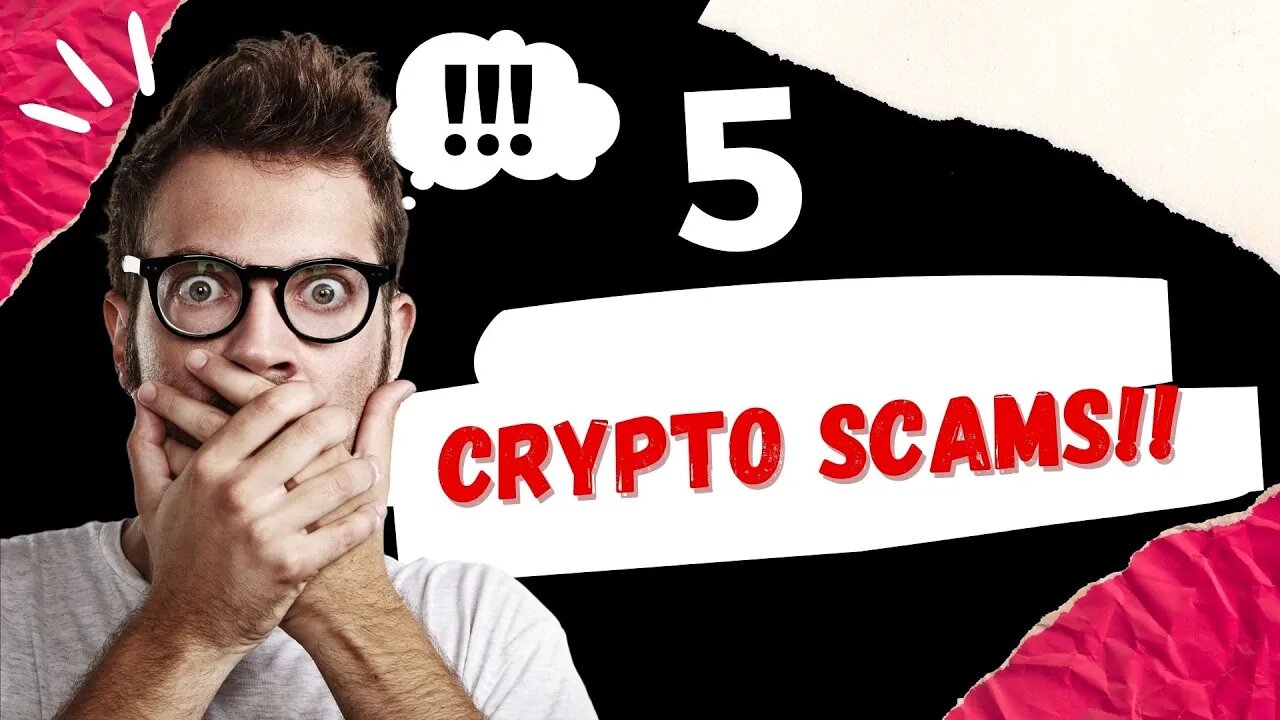Premium Only Content

5 Crypto Scams - What You Need To Know
Main reasons why investing in cryptocurrencies like Bitcoin and Ethereum can be worrisome for beginners is the large number of frauds that plague the whole cryptocurrency ecosystem. Although some bitcoin scams are simple and easy to detect, others will be more intricate and difficult to avoid.
Bitcoin scammers have progressed to the point where they are all more complicated and have a wider reach in recent seasons. Malicious individuals have been hard at work improving their ways for duping naïve bitcoin users into falling prey to scams.
Despite the fact that cryptocurrency is a relatively new asset class, you'll find that many of these scams are recycled versions of old tricks. Here are five to be on the lookout for - you've undoubtedly seen similar versions before.
#5. Viruses and malware.
Scammers don't have to invent the wheel every time. A simple computer virus or spyware might sometimes be enough to obtain access to a person's crypto wallet and move all of the funds out. Victims have little recourse since these transactions are irreversible. Viruses and malware are well-known, and most attacks can be prevented with virus detection software. Always use two-factor authentication to safeguard your wallets and apps.
#4. Altcoin pump and dumps.
The conventional pump-and-dump method. Altcoins, like penny stocks, are frequently cheap and illiquid, with market capitalizations tiny enough that a few significant players can send the price skyrocketing. The crypto pump and dump works similarly to the penny stock pump and dump: a crypto guru or influencer buys large amounts of a speculative altcoin and then sells it to their followers.
Once the mob has gathered, the con artist leaves the scene, leaving the unwary followers holding the bag. Altcoins, like penny stocks, are extremely volatile, and it's not uncommon for investments to be halved in a single day.
#3. NFT scams.
Nonfungible tokens, or NFTs, are one of the hottest investment trends right now, because to the high prices being paid for everything from internet art to LeBron James highlights on NBA TopShot. NFTs are digital tokens that live on the blockchain and can be exchanged between users or marketplaces.
While the image or video in the NFT can be easily replicated, the hashtag code that corresponds to the NFT's location cannot. When it comes to crypto, though, possession is ten-tenths of the law, and whomever has the hashtag has the power. You'll have a hard time obtaining your NFT back if your account is hacked and the NFT is moved to an outside user (or compensation for it).
Scammers also take advantage of the potential for enormous profits by selling fraudulent NFTs to potential buyers. Scams involving NFTs are on the rise; only buy them from reputable sources and use two-factor authentication wherever possible.
#2. DeFi rug pulls.
Decentralized finance (DeFi) platforms aim to reintroduce classic financial models by allowing users to stake their cryptocurrencies on networks and receive interest, much like a savings account or CD. The owner of the cryptocurrency receives monthly payments that typically far surpass the rates offered by banks because the coin remains locked in the network.
While the majority of DeFi systems have good intentions, others are outright scams. Investors are duped into entrusting their bitcoin to a reputed DeFi company like Burn Vault Finance or Compounder Finance. Scammers lure investors into smart contracts with promises of high profits in exchange for their money, allowing them to take the cash without the genuine owner being able to reclaim them. The con artists then vanish in a puff of smoke. Be wary of DeFi platforms that promise too good to be true returns.
#1. Social media con artists.
Scammers can easily induce unwary customers to transfer them Bitcoin by using some good old-fashioned password hacking. In January 2021, hackers impersonating Elon Musk released a link to a Bitcoin wallet on Reddit, promising to double any BTC deposits submitted to that account. Doesn't it already sound suspicious?
Unfortunately, many of Musk's supporters would jump off the Golden Gate Bridge if he did it first, thus BTC started pouring into the associated wallet. Of course, the account in question wasn't Musk's wallet — in fact, it wasn't even Musk's Twitter! The con artists simply hacked another Twitter account with a blue checkmark, updated Musk's profile image and name, and replied to his earlier tweets with a link to the wallet.
Anyone who falls prey to this con will have more egg on their face than Denny's grill. However, crypto scammers utilize social media to deceive other users into paying them Bitcoin or signing up for a phony exchange (among other examples). Be wary of anyone offering free cryptocurrency on social media at random; it's almost always a fraud.
What do you think about our video? Let us know in the comment box below. Please like this video and subscribe to this channel for our future updates. Thank you.
-
 1:59:42
1:59:42
Glenn Greenwald
12 hours agoElection Eve Special With Michael Tracey, Briahna Joy Gray & Zaid Jilani | SYSTEM UPDATE #362
174K211 -
 3:47:50
3:47:50
VOPUSARADIO
1 day agoPOLITI-SHOCK! ELECTION COUNTDOWN W/ FMR CIA OFFICER KEVIN SHIPP & KENT HECKENLIVELY
91K2 -
 59:08
59:08
PMG
17 hours ago $20.82 earned"Fluoride, Chemtrails & Depopulation: The SHOCKING Truth THEY Don't Want You to Know"
75.6K9 -
 1:00:55
1:00:55
Donald Trump Jr.
16 hours agoWe Show Up. We Win. This is the Election to Save America | TRIGGERED Ep.188
187K211 -
 2:29:19
2:29:19
WeAreChange
13 hours agoRon Paul Joins Team MAGA! Dr. No Saves The Day?!
107K26 -
 1:03:16
1:03:16
The StoneZONE with Roger Stone
14 hours agoWill the Trump – RFK Alliance Prevail? The StoneZONE w/ Roger Stone
61.9K5 -
 1:01:53
1:01:53
We Like Shooting
23 hours ago $3.93 earnedDouble Tap 382 (Gun Podcast)
29.4K1 -
 5:05:52
5:05:52
Tundra Gaming Live
13 hours ago $3.15 earned🛑🧟 ♂ Better Dead Than A Zed Amiright???🧟 ♂ 🛑
32.2K -
![[Stream #10 ] First Descendent farming and having laugh :)](https://1a-1791.com/video/s8/1/8/7/Q/n/87Qnu.0kob-small-Stream-10-First-Descendent-.jpg) 4:26:55
4:26:55
OneRandomDolly
17 hours ago[Stream #10 ] First Descendent farming and having laugh :)
70.4K5 -
 52:57
52:57
Sarah Westall
14 hours agoIncredible Findings Disclosed: New Solutions – Dr. Group, Dr. Ardis, Dr. Ealy, Dr. Schmidt
47K9